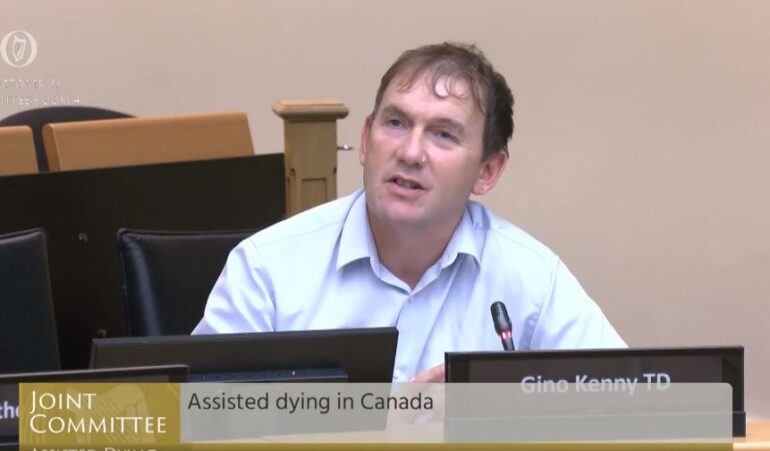Doctors and disability rights campaigners have presented the grim reality of the Canadian “Medical Assistance In Dying”(MAID) regime to the Oireachtas committee that is considering the introduction of such legislation in Ireland.
In Canada, euthanasia was introduced for the terminally ill only, which is the main proposal currently on offer here, but the ground expanded extremely quickly.
“Do not be Canada”, said Dr Heidi Janz of the Health Ethics Centre of the University of Alberta. Dr Janz is wheelchair bound. She told the committee that MAID was initially legalised in 2016 for people with ‘irremediable medical conditions’ but in 2021 the eligibility was expanded to people with disabilities, whose natural death is not reasonably foreseeable. From next year, those with mental illness as the sole underlying condition will qualify for MAID. All these changes were introduced on the basis that these are all forms of suffering and it would count as discrimination to offer euthanasia only to those who suffer physically or only to those who are dying soon.
“Canada is thus continuing its rapid descent down a slippery slope which many still claim does not exist. And so, I sit before this Committee today to implore you, for the sake of preserving true dignity and true choice for disabled, ill, old, and other structurally vulnerable people in Ireland, do not be Canada.”
Dr Leonie Herx, clinical professor of palliative medicine at the University of Calgary, explained that in more than 99.9pc of cases in Canada the lethal drugs are administered by a clinician. Assisted suicide, when the patient takes the drugs themselves, is extremely rare.
She claimed that MAID has had a profound effect on palliative care. “All healthcare facilities are expected to provide MAID, including hospices, whose core palliative care philosophy does not include hastening death. In Quebec, MAID legislation now requires all hospices and palliative care units to provide MAID. There are no euthanasia-free safe spaces”, she said.
Once legalised, it progressively becomes normal and is seen as a solution for virtually any form of suffering, she told the committee.
An increasing number of Canadians are receiving euthanasia “due to fear, loneliness and depression, social deprivation and isolation, lack of access to supports and adequate care needed for living, lack of access to parole for some prisoners, high cost of care and poor conditions at residential facilities.”
She quoted a former minister for disability inclusion who said that “in some places in our country, it’s easier to access MAID than it is to get a wheelchair”.
Prof. Trudo Lemmens, chair in Health Law and Policy at the University of Toronto, initially supported the first law but now he is troubled by having seen death being offered to patient with chronic illness or disability, often in a context of social disadvantage.
Canada is currently the country with the highest number of euthanasia deaths: more than 10,000 per year.
There are several reasons for this, according to Prof. Lemmens. The access criteria were vague in the legislation and have been interpreted excessively broadly by courts, leading to a constant expansion of those who qualify. Moreover, the fact that the lethal substances are administered by healthcare professionals, gives the false impression that it is part of medical care and makes it more acceptable. Regimes that allow only assisted suicide, such as Oregon, seem to have a lower uptake.
Also, Prof. Lemmens said, MAID is explicitly not treated as a last resort in Canadian law. “Healthcare providers do not need to agree that no other options remain. There is no obligation to make care or support available and try it first. Death has been transformed into first-line therapy for often only remotely disease-related suffering”, he said.
At the previous week’s hearings, pro-euthanasia TD, Gino Kenny (pictured), lambasted one of the witnesses about some of his claims about the Canadian regime. What was he thinking deep down this week after hearing the latest evidence?
(You can read the latest evidence here).

















